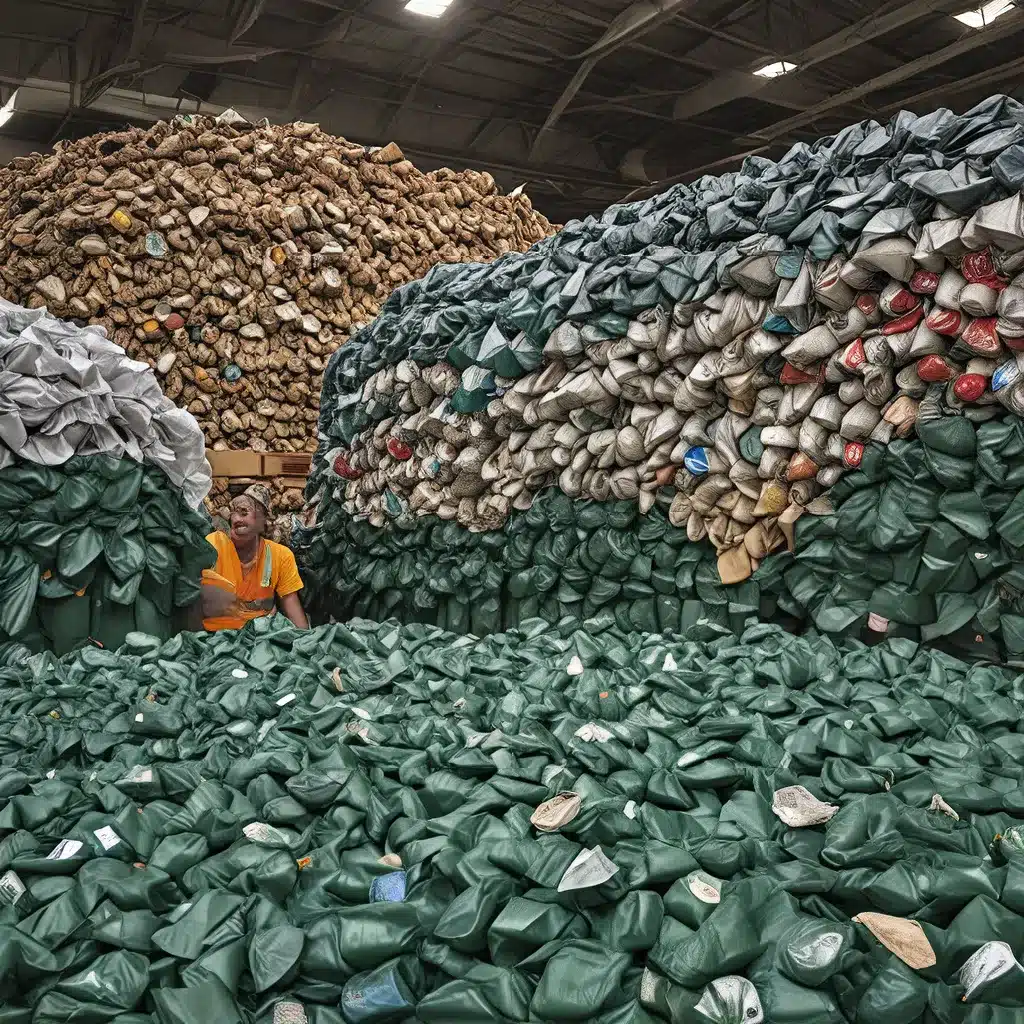
In a world where our trash seems to be piling up faster than we can blink, I’ve got to ask – how can we turn this daunting challenge into an opportunity? Well, my friends, the answer lies in the innovative recycling technologies that are revolutionizing the waste management industry.
The Alarming Rise of Global Waste
It’s no secret that waste management is one of the most pressing environmental issues of our time. According to the World Bank, global waste generation is expected to increase by 70% by 2050, reaching a staggering 34 billion tonnes per year. That’s a whole lot of trash, and it poses a serious threat to our health, natural resources, biodiversity, and climate change efforts.
But here’s the thing – with every challenge comes an opportunity. And when it comes to waste, we’ve got some incredibly innovative recycling technologies that are poised to transform the way we manage our trash. From smart waste bins to robotic sorting systems, the future of waste management is looking brighter than ever before.
Harnessing the Power of Pyrolysis
One of the most promising recycling technologies on the market is pyrolysis. This process involves heating waste materials at high temperatures in the absence of oxygen, effectively breaking them down into useful products like gas, oil, and char. Pyrolysis can work with a variety of waste streams, including plastics, tires, biomass, and even municipal solid waste.
What’s so great about pyrolysis, you ask? Well, for starters, it can help reduce greenhouse gas emissions and the amount of waste going to landfills compared to traditional waste disposal methods. And the best part? The end products of pyrolysis, like fuels, chemicals, and fertilizers, can actually be put to good use. It’s like turning trash into treasure!
Bioplastics: The Sustainable Alternative
Another innovation shaking up the waste management game is bioplastics. These are plastics made from renewable sources like corn starch, sugarcane, or even algae. Bioplastics can offer some serious advantages over their conventional counterparts, like a lower carbon footprint, biodegradability, and the ability to be recycled or reused multiple times.
Now, I know what you’re thinking – “But wait, aren’t bioplastics still facing some challenges?” You’re absolutely right. Things like high production costs, limited availability, and compatibility issues with existing recycling systems are all hurdles that the bioplastics industry is working hard to overcome. But with the way technology is advancing, I have a feeling we’ll be seeing even more sustainable plastic alternatives hitting the market in the not-so-distant future.
Blockchain: The Tech Transforming Waste Management
Hold onto your hats, folks, because blockchain technology is about to revolutionize the way we manage our waste. This distributed ledger system has the potential to provide real-time data on every stage of the waste management process, from generation to disposal. That means no more guessing when it comes to figuring out where our trash is going or how it’s being handled.
But the benefits of blockchain don’t stop there. It can also foster the creation of waste trading platforms, where producers and recyclers can exchange materials for both financial and environmental gains. And get this – blockchain can even incentivize sustainable practices, encouraging consumers and businesses to adopt more eco-friendly consumption and production patterns. Talk about a game-changer!
Sustainable Practices: The Glue that Holds it Together
As impressive as these recycling technologies are, they’re not the whole story. Sustainable practices are also essential for revolutionizing waste management, and they come in all shapes and sizes.
One of the most important principles is the 3Rs: reduce, reuse, and recycle. This approach aims to minimize the amount of waste generated at the source, extend the lifespan of products and materials through reuse or repair, and recover the value of waste through recycling or composting. It’s a simple yet powerful concept that can help us save natural resources, energy, water, and money while reducing our environmental impact.
Another sustainable practice is green procurement, which is the process of selecting products and services with lower environmental impacts throughout their life cycle. Green procurement can help reduce waste generation by choosing durable, reusable, recyclable, or biodegradable items, and it can also promote green innovation and market development for eco-friendly products and services.
And let’s not forget the power of education and awareness-raising. These efforts are crucial for changing attitudes towards waste management and inspiring people to take action, whether it’s through community clean-ups, recycling campaigns, or zero-waste movements. After all, the more informed and engaged we are, the better we can tackle this challenge together.
A Future Built on Innovation and Sustainability
When it comes to waste management, the future is looking brighter than ever before. Thanks to the incredible innovations in recycling technology and the widespread adoption of sustainable practices, we’re well on our way to transforming our trash into a valuable resource.
From the game-changing potential of pyrolysis and bioplastics to the revolutionary impact of blockchain, the waste management industry is undergoing a remarkable transformation. And when you combine these technological marvels with the power of the 3Rs, green procurement, and public education, you’ve got a recipe for a more sustainable and circular economy.
So, my friends, let’s embrace this exciting new era of waste management. Let’s roll up our sleeves, harness the power of innovation, and work together to create a cleaner, greener future for all. After all, Inland Waters Inc. is always at the forefront of environmental solutions, and we’re thrilled to be part of this revolution.


